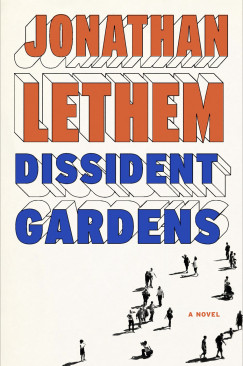 Go Figure: Musings from the Mind of Rob Wilstein
Go Figure: Musings from the Mind of Rob Wilstein
Ism-ism
Ev’rybody’s talkin’ ’bout
Bagism, Shagism, Dragism, Madism, Ragism, Tagism
This-ism, that-ism, ism ism ism
– John Lennon, Give Peace a Chance
Whether or not John Lennon’s 1969 rollicking peace anthem provided inspiration for Brooklyn-bred author Jonathan Lethem’s latest novel, Dissident Gardens, is arguable, but the proliferation of isms in Lethem’s sprawling, expansive and at times raucously rambling book is not.
Communism, Capitalism, McCarthyism, commune-ism, anti-Semitism, Quakerism, Nazism, Fascism, racism, feminism, pacifism, Judaism, Zionism, Lennonism, Leninism, Stalinism, assimilationism, all play a part, major or minor, in the epic family saga of the Angrush, Zimmer, and Gogan conglomerate. Add in the dubious philatelism and numismatism and that’s a lot of isms.
Throughout the book, though, all Lethem is saying is give life a chance. Ordinary life, with all its messy underpinnings and unpredictable outcomes, is what emerges from the confluence of all those isms. Spanning an ambitious time frame from post-World War II to the present day, there is little in the socio-political realm that Lethem leaves unexamined. Traveling from Lübeck, Germany to Sunnyside Gardens, Queens, from the neo-hippies settling Alphabet City to the Sandinistas in Nicaragua, Lethem’s Jewish, German, Irish and Black families confront Dylan’s changin’ times with fearless abandon.
In this, Lethem’s ninth novel since 1994, the author has rooted himself firmly in the tangled forest that is the Angrush Zimmer Gogan clan. With one notable exception, a long, late in the story imaginary affair involving Archie Bunker, he offers us a fictional reality that is at least a mid-distance cry from his past dalliances with talking kangaroos (Gun, With Occasional Music, 1994), scientists falling in love with black holes (As She Climbed Across the Table, 1997) and tigers on the NYC subway (Chronic City, 2009).
Rose Angrush, like Lethem, is also Brooklyn-bred, a shtetl-descended Jewish daughter of shopkeepers who meets and marries Albert Zimmer, of the Lübeck Zimmers, “the progressive, the enlightened, the worldly Zimmers…who felt their own place instantly: above them.” Rose and Albert are mid-level American Communist Party hacks, used by the party bigwigs to organize workers, distribute pamphlets and otherwise disturb the status quo of postwar New York. In short order, Albert, an ineffectual and effete mama’s boy whose drinking and careless habits alarm the Party’s leaders, is shipped off, back to Germany as a spy for the party, leaving Rose and their newborn daughter, Miriam, to fend for themselves in Sunnyside Gardens. Adding to Rose’s indignation at the party’s destruction of her family, Rose’s position is further downgraded when her affair with a married black policeman, Douglas Lookins, is discovered. Here is Lethem’s darkly comic take on Rose’s reaction.
“The fact of which Rose was proudest was one she’d never utter aloud…not even to Miriam, the daughter who was repository for Rose’s whole self…Yet it was her signature triumph: the containment of murder. Rose Zimmer emptied and rinsed the Lübeck ashtray three times during the course of her first trial. Ferrying the granite weapon…through the crowded room…Rose didn’t swing it to shatter Albert’s cranium…Nor did Rose crown any of the party’s high operatives…though they made it so easy, leaning in lusciously to plop sugar into their teacups…Nor did she go in and murder the newly fatherless girl, whose small body Rose would still have been able to hoist through the window…no, on the night Rose Zimmer discovered she possessed not only the desire but the capacity for murder…She’d killed not even one of them. She’d carried the ashtray out filthy and carried it back in as spotless as the best-paid Lübeck housekeeper could ever have made it.”
Rose’s descent into the menial duties conferred upon her by the party as she supports herself working in and organizing the employees of Real’s Radishes and Pickles, “workers whose daily facts…plunging elbow-deep in barrels of chill salt brine, put to shame…the posturing organizers...” is counterpointed by her daughter Miriam’s precocious adolescence, her sorties into the Greenwich Village of the sixties, posturing herself as a liberated, Communist Party-bred, free spirit. Enter Tommy Gogan, of the Belfast Geoghans, name changed to simplify it (assimilationism) for the listeners of the Gogan Brothers sweet Irish fifties’ ballads. Swept into the Age of Aquarius by Miriam Angrush Zimmer, Tommy turns his guitar and his song-writing to the Negroes “littering the Bowery…black by definition (it was at this moment that he resolved to join (Miriam) in exchanging the one word for the other) whatever the shades of their faces. They were blackened by condemnation.” Tommy and Miriam’s union produces Sergius Zimmer Gogan, the sweet-faced Jewish-Irish boy who eventually carries the family business of dissidence into the Occupy movement.
Rose’s extended family includes Cicero Lookins, the giant dread-locked, moon-faced, intellectual, homosexual Princeton-educated professor son of her black policeman lover and his long-suffering wife Diane, a boy who has always felt closer to Rose than to his own mother, and Rose’s cousin Lenny (nee Lenin) Angrush, an unkempt, nebbishy misfit of a chess-playing philatelist who has been in love with his cousin Miriam since he held her on his knee as an infant.
It is Lenny’s run-in with the Irish Republican Army goons who are out to maim him for their perceived swindle on his part involving some counterfeit Krugerrand gold coins (hence, numismatism), that leads to a hilarious scene between Lenny and Rose. On the run from the IRA, fresh from the oft-ridden Queens number 7 train that is practically a character in itself, identity hidden behind an Abraham Lincoln top hat and beard, Lenny goes to the only refuge he can think of, sixty-year-old cousin Rose’s Sunnyside apartment.
“Rose opened the door and let him in without a word. “Four score and seven years ago today“, Lenny said aloud, and his initial jest was overtaken by the sincerity the words and occasion seemed to demand…Lenny’s lips couldn’t from within the Lincoln beard say hide me or hold me though he desired both…Rose in her nightgown stepped back across her kitchen linoleum and stared at the Lincoln silhouette against the moonlit green of the…courtyard gardens…Lenny closed the door behind him. His tongue might be frozen but he still possessed the righteousness inside his Lincoln pants…This was like the hangover boner Lenny could rely on…or perhaps like the notorious erection discovered when they cut down and examined the body of a hanged man…”Four Score!” he said again, deepening his voice…He wished to thrill and command her…The silky layers he tore free of their buttonholes…each held some bulging soft portion of her…the beard got in between his mouth and hers and had to be ripped free…each issuing cat-with-hairball noises…before he mumble(d) wonderment at her neck…and into the sweet fog of her breasts…Their flesh pooled warmly, in regions grown sadly unfamiliar to him over the past years…The unmistakable connection, never young or old in its essence…What a sorry scene he made…His hard-on the last hardness in him, now spent.
“You know who I am?” he said into the dark.
“You thought you could fool an Angrush from recognizing an Angrush?”
Despite its forays into the social and political upheavals of the late twentieth century, Dissident Gardens (name taken from the idyllic Institute grounds in Dresden where Albert Zimmer has found refuge) is a novel about loss and grief. Loss of political idealism, loss of purpose in life, loss of social position, of husbands and wives and parents and children. Grief embodied by physical decline and mental atrophy. Rose in her youth wanted status, recognition. Later she sought vindication and some measure of respect. In the end, Lethem’s intimate portrait of a woman and her progeny leaves us with Rose being satisfied with a good bowel movement.

